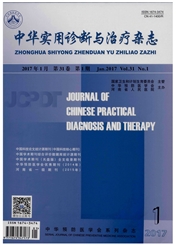

 中文摘要:
中文摘要:
目的:探讨经鼻塞持续气道正压通气治疗新生儿呼吸衰竭的临床疗效,可能发生的不良反应和对患儿体格、智能发育的影响。方法:将150例呼吸衰竭新生儿分为气管插管间歇指令通气(IMV组)和经鼻塞持续气道正压通气(NCPAP)组。IMV组(55例)采用气管插管间歇指令通气;NCPAP组(95例)采用经鼻塞持续气道正压通气治疗,比较两者疗效,并对两组患者进行随访,观察其体格及智能发育情况。结果:(1)两组患者各项血气指标均得到明显改善(P〉0.05);(2)NCPAP组上机治疗时间比IMV组明显缩短(P〈0.01);(3)并发症发生率NCPAP组为31.1%,IMV组为83.3%,两组比较P〈0.01。结论:经鼻塞持续气道正压通气治疗新生儿呼吸衰竭,疗效好,并发症少,可减少机械通气时间。
 英文摘要:
英文摘要:
Objective To investigate the clinical effect of nasal continuous positive airway pressure on neonatal respiratory failure, possible adverse effect and influence on physical, intellectual development of the patients. Methods One hundred and fifty neonates with respiratory failure were divided into IMV group and CPAP group. The IMV group (55 cases) was treated with intermittent mandatory ventilation after tracheal intubation. The CPAP group, (95 cases) was treated with nasal continuous positive airway pressure. The therapeutic effect of the two groups was compared. The physical and intellectual development of the patients was observed. Results (1) The blood gas index of the two groups were improved obviously (P〉0.05). (2) The time of used ventilator in NCPAP group was obviously shorter than that of IMV group ( P〈0. 01). (3) Complication incidence rate was 31.3% in NCPAP group and 83. 3% in IMV group(P〈0. 01). Conclusion Nasal continuous positive airway pressure is effective to treat neonatal respiratory failure. The needs for mechanical ventilation and complications can be reduced in this way.
 同期刊论文项目
同期刊论文项目
 同项目期刊论文
同项目期刊论文
 期刊信息
期刊信息
